Key takeaways:
- Hands-on collaboration fosters problem-solving and team dynamics, enhancing the learning experience in app development.
- Understanding User Experience Design is essential; empathy and usability drive successful app interactions.
- Building a diverse portfolio through projects showcases skills and reflects personal interests, increasing employability.
- Adaptability and receptiveness to feedback are crucial for overcoming challenges and refining projects in tech development.
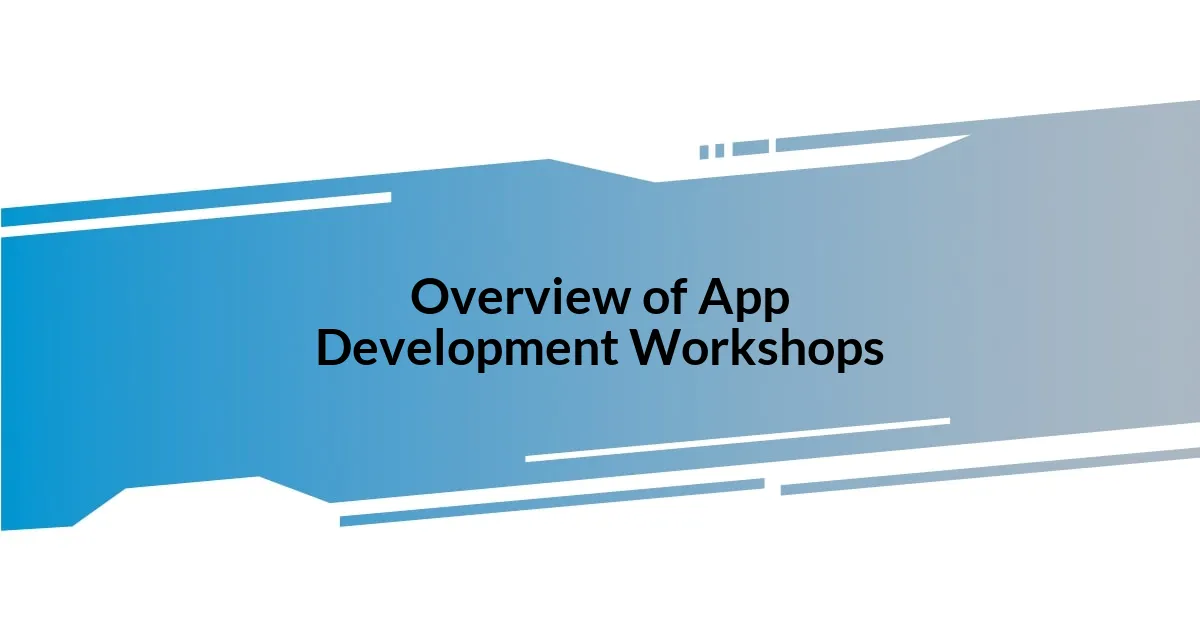
Overview of App Development Workshops
App development workshops serve as an exciting gateway for many aspiring developers. I still remember my first workshop; the energy in the room was palpable, filled with curious minds eager to create. Have you ever been in an environment where everyone shares the same pulse of enthusiasm? It’s an experience that not only fosters collaboration but also sparks innovation.
These workshops often cover a wide range of topics, from basic coding principles to advanced app design. I recall how we dived into user interface (UI) design one afternoon; it was eye-opening to see how color choices and button placements could dramatically influence user experience. Isn’t it fascinating how the little things can make or break an app’s success?
Moreover, I found that hands-on projects are integral to these workshops. The beauty of applying what you learn in real-time is unmatched. I vividly remember working late into the night with my peers, troubleshooting code over cups of coffee. It made me realize that the real learning happens when you encounter challenges and work through them together. Have you ever experienced that sense of camaraderie while solving a problem? Those moments truly cement the lessons learned.
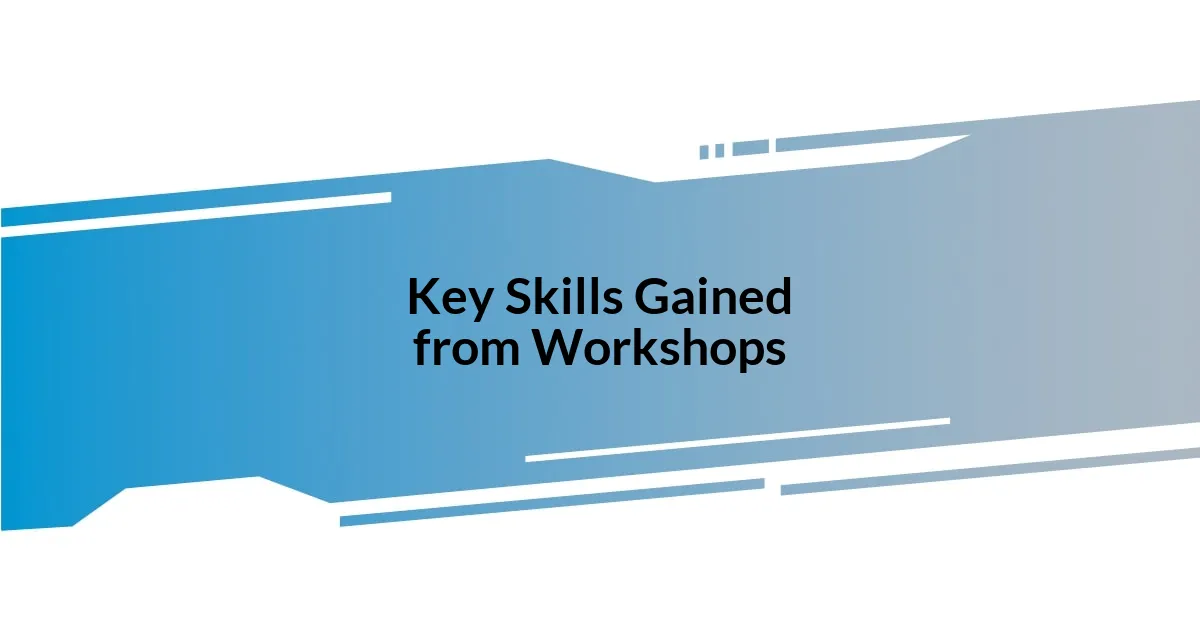
Key Skills Gained from Workshops
Participating in app development workshops has equipped me with a variety of vital skills. One of the most crucial skills I gained was teamwork. I remember collaborating on a group project where we had to develop a basic app. We divided tasks based on our strengths, and I took on the role of handling the backend coding. It was invigorating to see how our different skills came together to create something functional. Have you ever felt the thrill of completing a challenge as a team?
Another essential skill honed during these workshops was problem-solving. One evening, we hit a major snag in our app due to a persistent bug. The atmosphere was tense as we all batted ideas around, and I vividly recall that moment when we finally found the solution together. It wasn’t just about coding but understanding the logic behind it, which deepened my appreciation for the entire process. This experience showed me that sometimes, the best way to grow is to face a challenge head-on.
Lastly, I noticed that communication skills significantly improved as well. In workshops, we often had to present our work and explain our design choices. I remember feeling nervous before my first presentation, but the supportive feedback from peers helped me build confidence. Now, I can effectively convey my ideas, which is invaluable in any collaborative project. It’s amazing how such workshops push you to step out of your comfort zone, don’t you think?
| Skill | Description |
|---|---|
| Teamwork | Collaborating with peers to complete projects using diverse skills. |
| Problem Solving | Addressing and resolving coding challenges in real-time. |
| Communication | Presenting ideas clearly and receiving feedback from peers. |
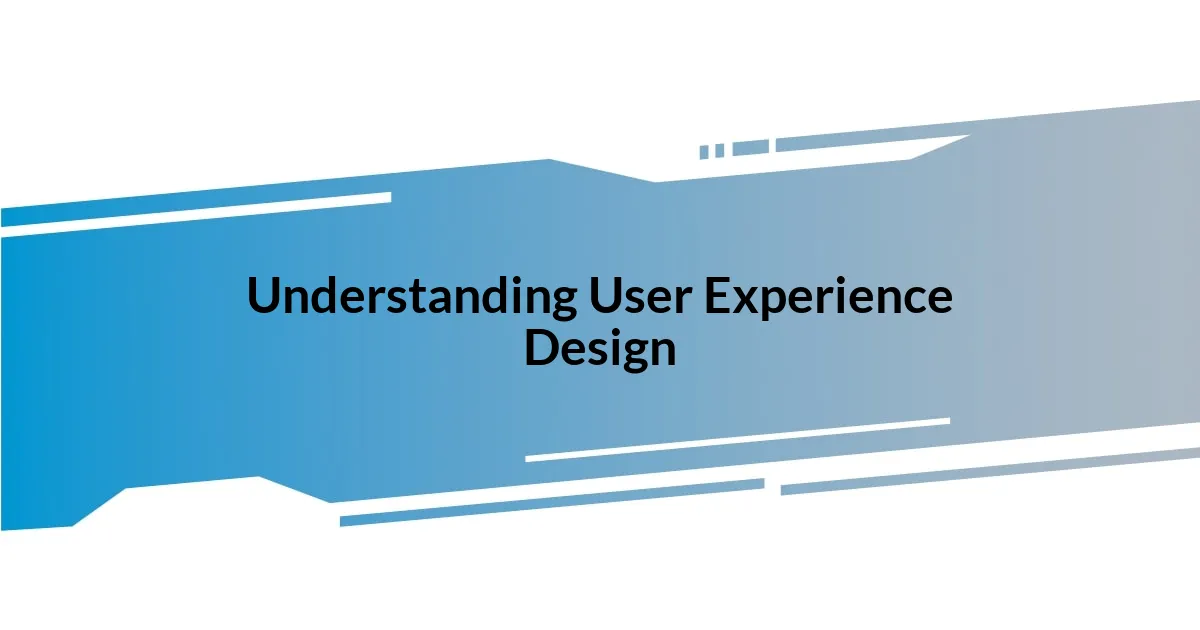
Understanding User Experience Design
Understanding User Experience Design is like discovering a new language that speaks to your user’s needs and desires. During my workshops, I realized that great apps aren’t just built on code; they’re shaped by understanding how users interact with the interface. One activity that stood out to me was when we tested each other’s app prototypes. Watching firsthand how users responded—like the way they instinctively clicked on certain elements—was fascinating. It made me feel more attuned to what users truly experience.
Here are a few essential principles of User Experience Design that emerged during our discussions:
- Empathy: Understanding the target user’s needs and motivations is crucial. Recognizing their pain points can really help in creating solutions that resonate.
- Usability: An app should be easy to navigate. Simple, intuitive designs lead to better user satisfaction. During one session, we revamped a complicated navigation flow, and seeing how much smoother the experience became was gratifying.
- Feedback: Users need to feel heard. We learned the importance of integrating user feedback in iterative design processes. I remember refining our app after testing sessions, which not only improved the design but also deepened our connection with the end-users.
These principles became my guiding stars for future projects, ensuring my designs always placed user experience at the forefront.
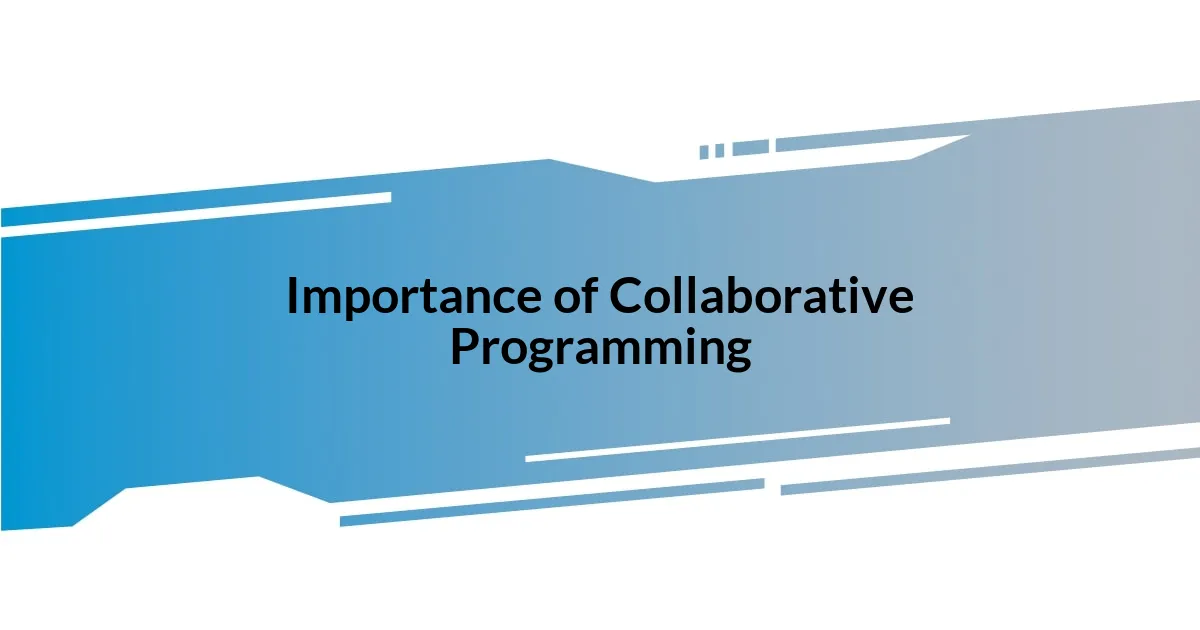
Importance of Collaborative Programming
Collaborative programming is a game-changer in app development. During one workshop, I recall how my group tackled a particularly complex feature together. We sat in a circle, laptops open, brainstorming ideas, and combining our skills. The fusion of our different viewpoints lead to a solution I hadn’t thought of on my own. Have you ever experienced that magic when collective intelligence sparks innovation?
Working together also fosters not just technical growth but personal connections. I remember feeling a sense of camaraderie when we celebrated each solved bug or successfully integrated a new function. It wasn’t just about writing code; it was about sharing the triumphs and challenges as a group. This mutual support made the journey enjoyable and built a trust that I now realize is essential in any team environment.
Moreover, collaborative programming encourages ongoing learning. I often found myself learning something new from my peers—whether it was a coding technique I hadn’t encountered before or a debugging strategy that streamlined our workflow. This exchange of knowledge ignited my passion for learning more, reminding me that there’s always something to discover when we work together. Isn’t it uplifting to think about how much we can grow just by leaning on each other?
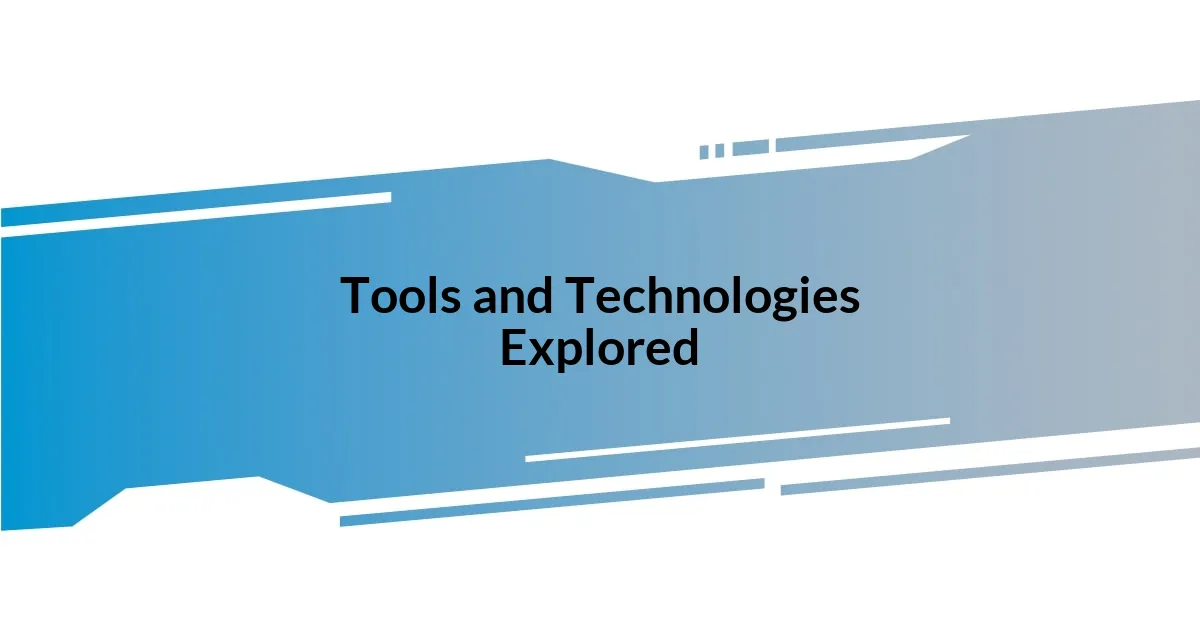
Tools and Technologies Explored
Exploring the tools and technologies during the app development workshops opened my eyes to a range of industry standards. One platform we delved into was React Native, a framework that allows for cross-platform app development. I remember the excitement I felt when I realized that I could write one set of code and deploy it on both iOS and Android. It made me think: how much time could I save on future projects?
Another essential tool we worked with was Git for version control. Initially, I was a bit daunted by the idea of managing code versions—what if I mess up something important? But after a few hands-on sessions, I found Git to be incredibly empowering. I loved the thrill of branching off to try new features, knowing I could always revert back if needed. It felt like having a safety net while exploring the vast possibilities of app development. Who knew that managing code could be this liberating?
We also had an insightful look at cloud services like Firebase, which drove home the importance of backend integration. During one session, I was involved in setting up user authentication, and I distinctly remember the rush of seeing everything come together seamlessly. This process made me wonder: how crucial is a solid backend to the overall app experience? Without the right tools, even the best design can fall flat. This realization reinforced my understanding of how the right technology stack can make or break an application.
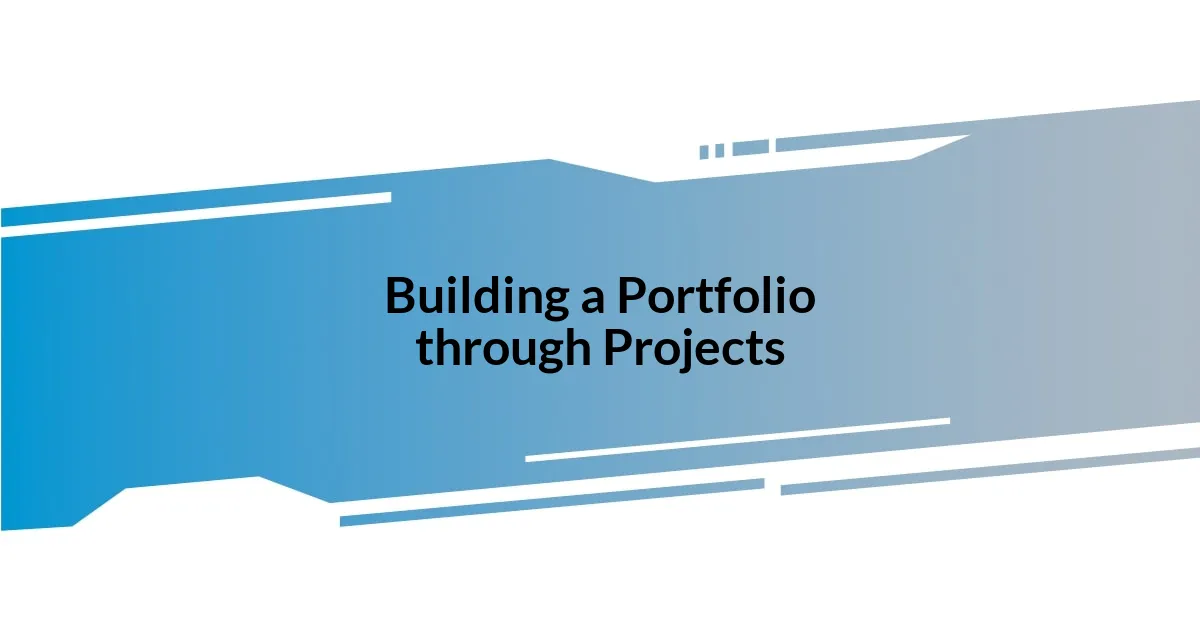
Building a Portfolio through Projects
Building a portfolio through projects is a fantastic way to showcase your skills. I remember the thrill of my first solo project at a workshop, a simple to-do list app. As I pieced together the code, I felt a mix of excitement and nervousness—would it actually work? When everything functioned as planned, it sparked a newfound confidence in my abilities. When you create something tangible, like a working app, you gain credibility and proof of your expertise that makes it easier to land future opportunities.
As I started sharing these projects in my portfolio, I noticed how potential employers responded to my hands-on experience. It wasn’t just about what I knew; it was about what I had built. Each project told a story. There was the fitness tracker that integrated with APIs and tracked dynamic data, and the budgeting app that I crafted during late-night brainstorming sessions with friends. These projects reflected not only technical skills but also my problem-solving approach—how I navigated challenges and learned from mistakes. Have you ever thought about how storytelling through your work can resonate with others?
I learned quickly that diversity in project choice matters too. Mixing personal interests with technical challenges allows your portfolio to shine. For instance, when I created an app focused on mental health resources, my passion for the topic propelled my work. The feedback I received was affirming; people connected with it on a deeper level. Crafting projects that resonate with your experiences not only enhances your portfolio but also makes you more memorable in the eyes of potential collaborators or employers. What projects truly inspire you? Pursue them, and watch your portfolio come alive with your unique story.
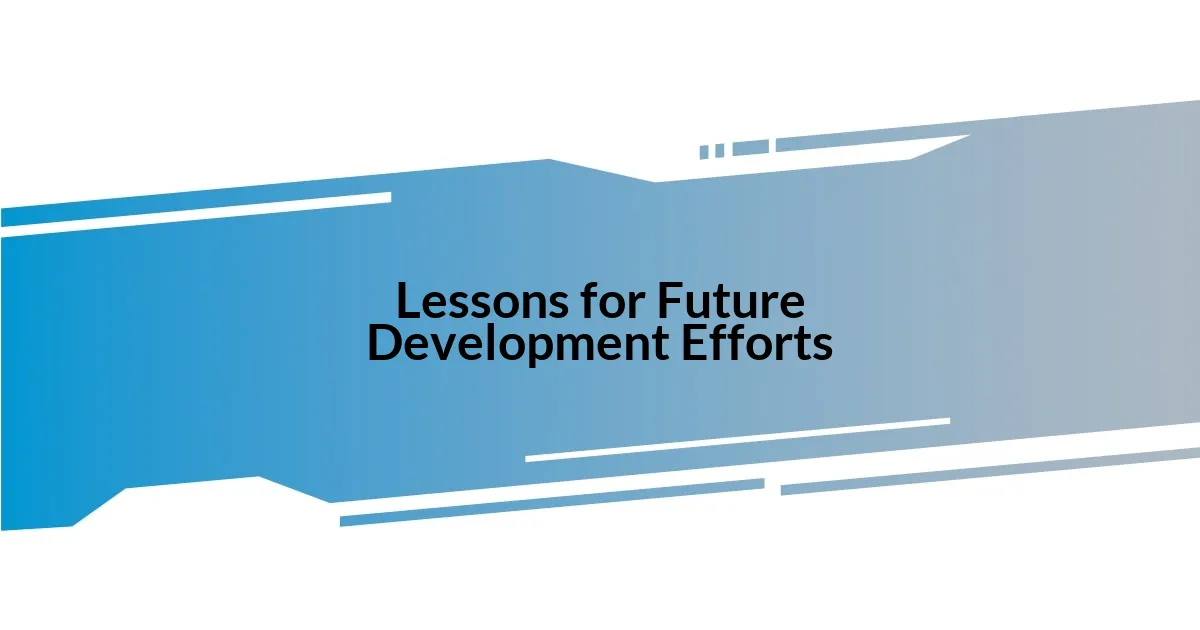
Lessons for Future Development Efforts
Every workshop taught me that collaboration is key to successful development. I vividly recall a brainstorming session where my team and I tossed around ideas for a new app. Initially, I felt my vision was too out there, but as we exchanged thoughts and built on each other’s suggestions, the project evolved. It was a reminder that diverse perspectives often lead to innovative solutions. How often do you leverage collaboration in your own projects?
Another lesson that stands out is the importance of user feedback. During one of our app demos, we invited peers to test our creations. Their reactions were unexpectedly candid but incredibly helpful. I remember feeling a bit vulnerable, sharing my work and facing criticism, yet that feedback ultimately refined my project. It’s a humbling experience—sometimes, you need an outsider’s view to truly see the strengths and weaknesses of your work. How receptive are you to feedback when developing your applications?
Lastly, I realized the necessity of adaptability in technology. At one workshop, we attempted to integrate an API that ultimately was deprecated. Initially, I felt frustrated, as it seemed like we had hit a wall. However, pivoting to an alternative solution not only salvaged the project but also deepened my understanding of resourcefulness. Being able to adapt to changing circumstances is vital in the tech landscape. How prepared are you to embrace change in your future development efforts?